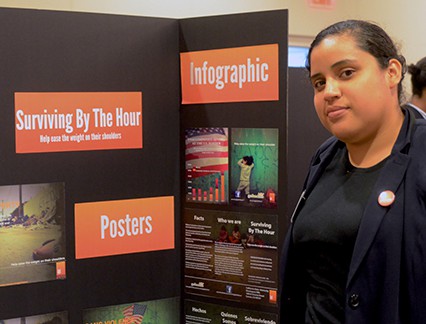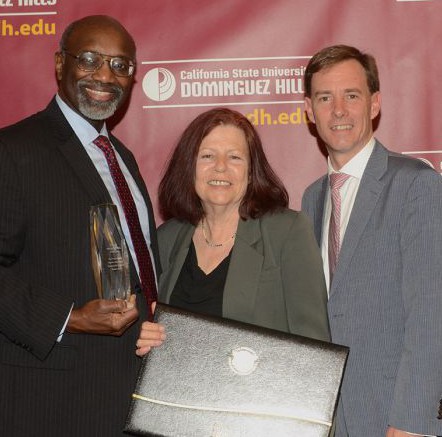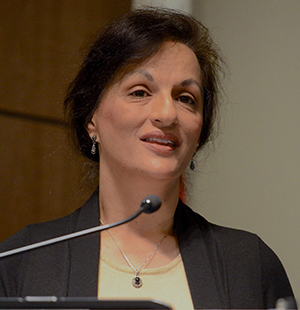
Scared, alone and with no real place to go, several children stand with full plastic grocery bags on the United States side of the U.S.-Mexico border while being detained by border patrol officers.
After they’re taken to a shelter, a few are handed empty brand new backpacks. They dump their grocery bags into the packs and fill them with what is likely everything they have in the world.
For California State University, Dominguez Hills (CSUDH) art design students Deborah Paramo and Maria Vargas, who designed the student-learning project “Surviving by the Hour: The Migration of Unaccompanied Minors” to raise funds to purchase and donate the backpacks, “everything they have in the world” is quite heavier than it looks.
To help explain their point, the students wrapped four bricks and labeled them “Discrimination,” “Extreme Poverty,” “Sexual Violence,” and “Gang Violence” to include as part of their project display during the second annual Community Engagement Symposium at CSUDH on March 25.

“The backpacks we donate are actually empty. These bricks here are symbolic,” said graphic design student Paramo as she points to the four bricks next to her display. “We try to understand the ‘psychological’ weight they have on their shoulders. The weight is determined by how many negative things they’ve had to deal with at home and while traveling to the border, such a violence and sexual abuse. The more bricks kids have in their packs the more weight they must carry around for the rest of their lives.”
Paramo’s and Vargas’ display detailed their success in raising funds to buy the backpacks and distribute them in Texas where many of the more than 77,000 unaccompanied children were apprehended crossing from Mexico in 2014.
Along with student displays, the symposium featured community outreach presentations, and honored the faculty and staff whose work and mentorship resulted in more than 9,500 students logging in over 150,000 hours of community service in 2013-2014. Much of the work is done through service learning programs that are carried out by students in more than 300 CSUDH courses. Their work is estimated to have generated a positive economic impact of approximately $3.3 million in local communities.
The symposium also included service-related presentations by keynote speaker Vivian Price, associate professor of interdisciplinary studies and labor studies; Mitch Maki, vice provost, student academic success; Michele Bury, department chair, art and design; and Pablo Garcia-Hernandez, director of education for Woodcraft Rangers.
President Obama’s ‘Honor Roll’
The event also provided the perfect venue for the official presentation of the President’s Higher Education Community Engagement Honor Roll’s “Presidential Award” to CSUDH by the Corporation of National and Community Service (CNCS). The award was accepted by university President Willie. J. Hagan.

The university is one of only four institutions in the U.S. to receive the honor roll’s highest honor, and the only institution that received the award in the General Community Service category for its commitment to serving the community and providing students with meaningful opportunities to enhance their academics.
“I’m proud to represent President Obama as well as the Corporation of National and Community Service to present this award to California State University, Dominguez Hills,” said John Kelley, deputy director and chief of staff for CNCS in Washington D.C. “… The community service that you’re doing now will launch a lifetime of service for your students.”
Before receiving the award, President Hagan invited those in the audience involved in service-learning programs on stage to “acknowledge that the work is really done by Cheryl (McKnight), her team and the students, faculty and staff of this university.”
“This is a really big deal. Not only because we’re recognized at the national level, but because it really recognizes that this campus is fully embracing a central part of its mission,” said Hagan. “Many of you know we were placed here to engage the community. It’s our mission. Our jobs are to help transform the community and, in turn, we are supposed to be transformed, and I think both of those things have happened.”
Community Engagement Awards
The Community Engagement Awards were presented by Cheryl McKnight, director of the Center for Service Learning, Internships and Civic and Community Engagement (SLICE) at CSUDH, who began with the presentation of the “Community Hero Award” to Sophia Momand, staff physician in Student Health and Psychological Services at CSUDH.
For more than 15 years, Momand has been delivering hygiene kits and providing basic health care to homeless individuals and families on Skid Row in downtown Los Angeles (MSNBC story). Much of the items are donated by CSUDH students, faculty, and staff.
“I really don’t deserve this–the work goes on. But I’m very humbled and appreciative of all the attention,” said Momand. “As long as there are hearts out there that need to be consoled, minds that need to be inspired, and bodies that need help in being healed, then there’s always work out there that we need to do.”

In spring 2014, CSUDH students launched the club Homeless Outreach Promoting Empathy (HOPE) to bring more awareness to the cause, and collect and prepare the hygiene kits for distribution.
“I love working with the students here, they’re so wonderful. They’ve made my job even more rewarding,” said Momand.
Four programs that work in conjunction with SLICE were honored with Outstanding Community Partner Awards: JusticeCorps, Jumpstart for Young Children, Behavioral Health Services, and NVISION.
“We’d like to thank the university for this award,” said Sheree Andaya, Los Angeles-based program coordinator for JusticeCorps, which trains college students to assist and provide legal information to self-represented litigants at court-based centers. “We are very happy to have had Cal State Dominguez Hills students be part of our programs for the 11 years we’ve been around. We really owe that to the partnership that we have with SLICE. Without their support in helping us promote this program on campus we wouldn’t be as strong as we are today.”
Each year, 40 CSUDH students volunteer for the Jumpstart for Young Children program and mentor preschoolers in reading, math and language acquisition to help prepare them for kindergarten. Research shows that if a child is starting to read by kindergarten, they’re not only more likely to go to college, but to graduate as well, according to McKnight.
“The work is really about the students. Sergio’s group and Cheryl really couldn’t represent this university better,” said Alberto Mendoza, executive director of Jumpstart for Young Children, of McKnight and Jumpstart campus coordinator Sergio Pineda. “Their work and commitment in the classroom and community really make such a significant difference. So I want to thank all of you on behalf of the children of Jumpstart and the community.”